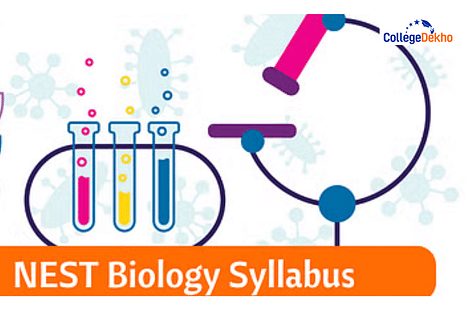NISER and UM-DAE CEBS has released NEST 2025 Biology Syllabus. NEST 2025 exam will be held on June 22, 2025. Download the NEST Biology syllabus PDF here. Continue reading for more information!

NEST 2025 Biology Syllabus
is very crucial for those who are appearing for NEST Exam 2025. NEST Biology Syllabus 2025 has been released by NISER (National Institute of Science Education and Research) and UM-DAE CEBS (University of Mumbai - Department of Atomic Energy Centre for Excellence in Basic Sciences). Biology is an important subject in the NEST exam, accounting for 50 marks. Students willing to appear for NEST Biology exam should carefully review the prescribed NEST syllabus 2025. Biology is one of the most important components of the online/computer-based test for admission to the 5-year Integrated MSc course in Biology, Chemistry, Mathematics, and Physics at NISER, Bhubaneswar and UM-DAE CEBS, Mumbai.
NEST 2025 application form was released on February 17, 2025. Moreover,
NEST 2025 exam
is scheduled to be held on 22 June, 2025. As the exam date is announced, you must start your preparation considering
NEST preparation tips 2025
. NEST exam 2025 will be held in two sessions. The first session will commence at 9:00 AM and will end at 12:30 PM. The second session will be held from 2:30 PM to 6:00 PM. NEST exam will be a Computer Based Test (CBT) and you will attend one of the two sessions.
Read on to know the detailed NEST Biology syllabus 2025!
NEST 2025 Biology Syllabus
The following table consists of a list of Chapters and topics included in the NEST Biology Syllabus:
Chapters
|
Topics
|
|---|
Cell Biology
| -
Cell theory and cells as units of life.
-
Basic concepts of biomolecules – Proteins, Carbohydrates, Lipids, Nucleic acids.
-
Tools and techniques of cell studies – use of microscope and calibration (microscopy), elements of microscope.
-
Biomembranes – transport mechanism, cellular respiration.
-
Cell organelles – structure and functions.
-
Discovery and structure of DNA, processes of replication, transcription, genetic code and translation.
-
Principles of the basic techniques in molecular biology.
-
Enzymes– catalysis, kinetics, activation energy, competitive and non– competitive inhibition.
|
Genetics and Evolution
| -
Fundamentals of genetics and evolution.
-
Evidence and theories of organic evolution.
-
Organization of the hereditary material in chromosomes.
-
Equational division.
-
Reduction division.
-
Mitosis and meiosis compared and contrasted.
-
Significance of meiosis.
-
Mendel's laws of inheritance.
-
Discovery of linkage, sex–linked inheritance.
-
Crossing– over, stage at which crossing– over occurs.
-
Neurospora genetics.
-
Mutation – discovery, types of Mutation and Mutations in diploids.
-
Role of mutations in evolution.
-
Elaboration of Mendel's laws of inheritance.
-
Monohybrid or Dihybrid crosses.
-
Human genetics – human chromosomes, sex–determination, sex–linked inheritance.
|
Ecology
| -
Physical and biological factors in influencing organisms.
-
Food chains, pyramids of numbers and biomass.
-
Biological equilibrium.
-
Interspecific associations.
-
Bio–diversity.
-
Flora and fauna.
-
Basics of microbial systems, Ecosystems.
|
Humans and Environment
| -
Soil, rainfall and temperature with reference to natural resources.
-
Our natural resources – their uses and abuses.
-
Environmental pollution and preventive measures.
-
Biodiversity and conservation.
|
Biotechnology
| -
Principles of recombinant DNA technology.
-
Applications of biotechnology.
|
Biology of Animal systems
|
Digestive System
-
Modes of nutrition.
-
Different vitamin compounds and their deficiencies.
-
Structure of alimentary canal and associated glands, digestive enzymes and gastrointestinal hormones.
-
Absorption of products of digestion, peristalsis, balanced diet.
-
Respiratory System – Gaseous exchange in animals.
-
Structure of respiratory organs, mechanism of breathing, gaseous transport, tissue respiration.
Circulatory System
-
Open and closed systems.
-
Functions of blood and lymph.
-
Microscopic structure of blood and blood vessels.
-
Structures and working of the heart.
-
Distribution of arteries and veins.
-
Circulation of blood coagulation.
-
Blood groups.
Excretory System
-
Elimination of nitrogenous waste.
-
Osmoconformers and osmoregulators.
-
Structure and function of kidney tubules. Arrangement of excretory organs.
Nervous System
-
General account of brain, spinal cord and nerves.
-
Re-ex actions (simple and conditioned). Sense organs (eye and ear).
Reproductive System
-
Sexual and asexual reproduction.
-
General arrangement and functions of reproductive organs.
|
|
Developmental Biology
| -
Basic features of development in animals.
-
Types of eggs, fertilization, cleavage, blastula.
-
Stem cells– definition, types, uses, advantages and disadvantages, induced pluripotent stem cells.
-
Different hormones and their roles.
-
Diversity of Animal Life — Principles of classification, binomial nomenclature.
-
General classification of animal phyla up to classes (invertebrates) and up to sub-classes/order (vertebrates).
-
General characters of fishes, amphibians, reptiles, birds and mammals.
|
Immunology
| -
Basics of immune mechanisms and diseases– active and passive immunity, T and B-cell responses, antigen presentation, principles of vaccination, monoclonal antibodies and their uses, immunology of AIDS.
|
Biology of Plant Systems
| -
Anatomy and Physiology of Plants – Meristems.
-
Plant growth and development.
-
Internal and external regulators of growth and development in plants.
-
Plant reproduction.
-
Internal structure of root, stem, secondary growth and leaves.
-
Xylem and Phloem – their cell elements and functions.
-
Internal structure of dicot and monocot leaves.
-
Photosynthesis – history, importance, factors and mechanism, stomatal mechanism, transpiration and respiration. Comparative study of dicot and monocot anatomy.
-
Absorption and cell–water relations, transport of water and minerals, tropic and turgor movements.
-
Significance of life–cycles with special reference to alternation of generations as exemplified in Funaria, Selaginella and Pinus (no structural details).
-
Plant hormones.
|
Systematics
| -
Principles of classical and new systematics.
-
Binomial nomenclature.
-
Familiarity with taxa.
-
Plant breeding and tissue culture.
|
Read Also:
NEST 2025 Best Books
NEST 2025 Best books must be referred by the students who are preparing for NEST Exam 2025. Students must note that the selection of best books and study materials are very significant while preparing for competitive exams. Even though the NEST Syllabus 2025 is like previous year but all the topics in detail cannot be only read through NCERT books. If you are willing to score well in NEST Exam 2025, then you must refer to books that contain detailed syllabus of Biology and covers topics such as Cell Biology, Genetics, Ecology, and Evolution. Students will be able to qualify NEST Exam 2025 if they refer to NEST 2025 best books along with NCERT books.
Check Also
For the latest updates on NEST 2025, Stay tuned to
CollegDekho
FAQs
Does NEST have biology?
The NEST exam syllabus primarily consists of four subjects. Biology, Chemistry, Physics, and Math. The NEST exam will ask questions from all four sections, so applicants should complete the syllabus for all four subjects.


















Similar Articles
CUET UG 2026 Correction Window: Dates, What to Crosscheck
CUET PG 2026 Exam Date: How This Timeline Affects Admission Planning
NEST Exam 2026 Registration: Why This Timeline Matters for Science Aspirants
CUET Business Studies 2026: Preparation Tips, Scoring Topics, Weightage
CUET 2026 Computer Science: Preparation Tips, Scoring Topics, Weightage
CUET 2026 Knowledge Tradition Syllabus (Released): Check Topics, Pattern, Download PDF